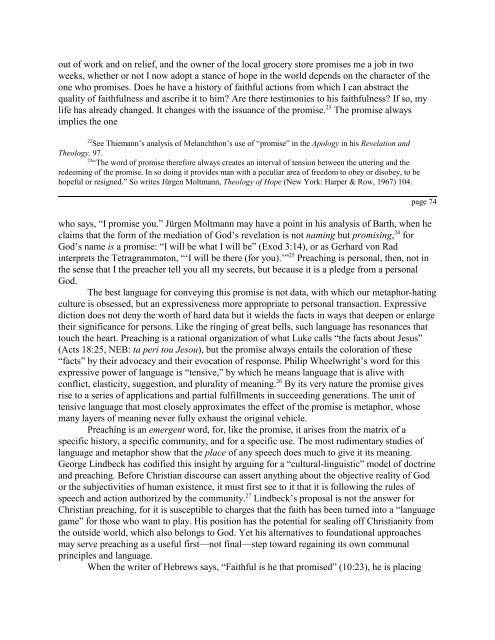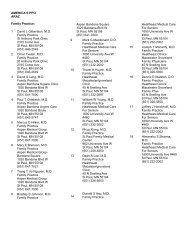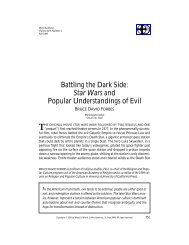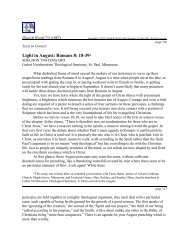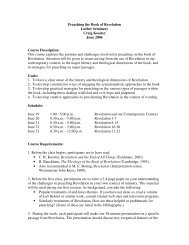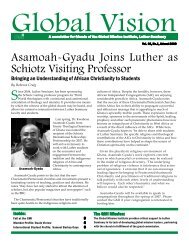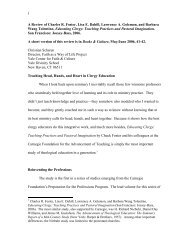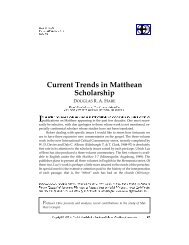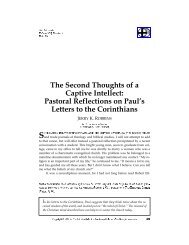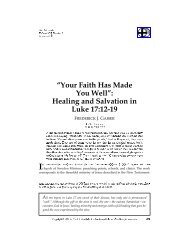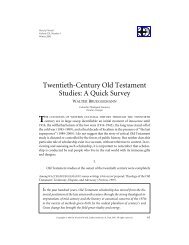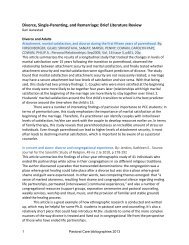Download Article PDF - Word & World - Luther Seminary
Download Article PDF - Word & World - Luther Seminary
Download Article PDF - Word & World - Luther Seminary
- No tags were found...
Create successful ePaper yourself
Turn your PDF publications into a flip-book with our unique Google optimized e-Paper software.
out of work and on relief, and the owner of the local grocery store promises me a job in twoweeks, whether or not I now adopt a stance of hope in the world depends on the character of theone who promises. Does he have a history of faithful actions from which I can abstract thequality of faithfulness and ascribe it to him? Are there testimonies to his faithfulness? If so, mylife has already changed. It changes with the issuance of the promise. 23 The promise alwaysimplies the one22See Thiemann’s analysis of Melanchthon’s use of “promise” in the Apology in his Revelation andTheology, 97.23“The word of promise therefore always creates an interval of tension between the uttering and theredeeming of the promise. In so doing it provides man with a peculiar area of freedom to obey or disobey, to behopeful or resigned.” So writes Jürgen Moltmann, Theology of Hope (New York: Harper & Row, 1967) 104.page 74who says, “I promise you.” Jürgen Moltmann may have a point in his analysis of Barth, when heclaims that the form of the mediation of God’s revelation is not naming but promising, 24 forGod’s name is a promise: “I will be what I will be” (Exod 3:14), or as Gerhard von Radinterprets the Tetragrammaton, “‘I will be there (for you).’” 25 Preaching is personal, then, not inthe sense that I the preacher tell you all my secrets, but because it is a pledge from a personalGod.The best language for conveying this promise is not data, with which our metaphor-hatingculture is obsessed, but an expressiveness more appropriate to personal transaction. Expressivediction does not deny the worth of hard data but it wields the facts in ways that deepen or enlargetheir significance for persons. Like the ringing of great bells, such language has resonances thattouch the heart. Preaching is a rational organization of what Luke calls “the facts about Jesus”(Acts 18:25, NEB: ta peri tou Jesou), but the promise always entails the coloration of these“facts” by their advocacy and their evocation of response. Philip Wheelwright’s word for thisexpressive power of language is “tensive,” by which he means language that is alive withconflict, elasticity, suggestion, and plurality of meaning. 26 By its very nature the promise givesrise to a series of applications and partial fulfillments in succeeding generations. The unit oftensive language that most closely approximates the effect of the promise is metaphor, whosemany layers of meaning never fully exhaust the original vehicle.Preaching is an emergent word, for, like the promise, it arises from the matrix of aspecific history, a specific community, and for a specific use. The most rudimentary studies oflanguage and metaphor show that the place of any speech does much to give it its meaning.George Lindbeck has codified this insight by arguing for a “cultural-linguistic” model of doctrineand preaching. Before Christian discourse can assert anything about the objective reality of Godor the subjectivities of human existence, it must first see to it that it is following the rules ofspeech and action authorized by the community. 27 Lindbeck’s proposal is not the answer forChristian preaching, for it is susceptible to charges that the faith has been turned into a “languagegame” for those who want to play. His position has the potential for sealing off Christianity fromthe outside world, which also belongs to God. Yet his alternatives to foundational approachesmay serve preaching as a useful first—not final—step toward regaining its own communalprinciples and language.When the writer of Hebrews says, “Faithful is he that promised” (10:23), he is placing


